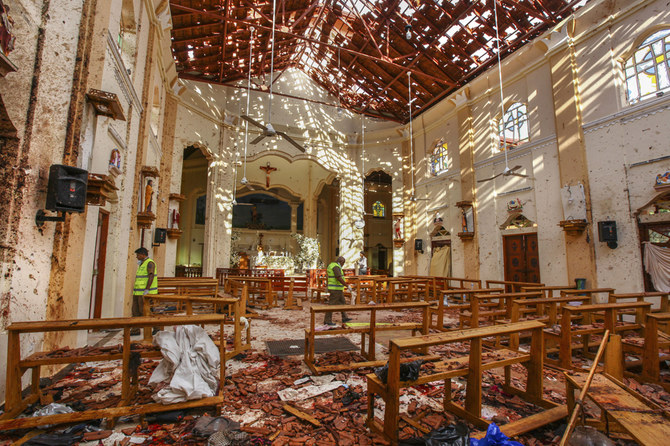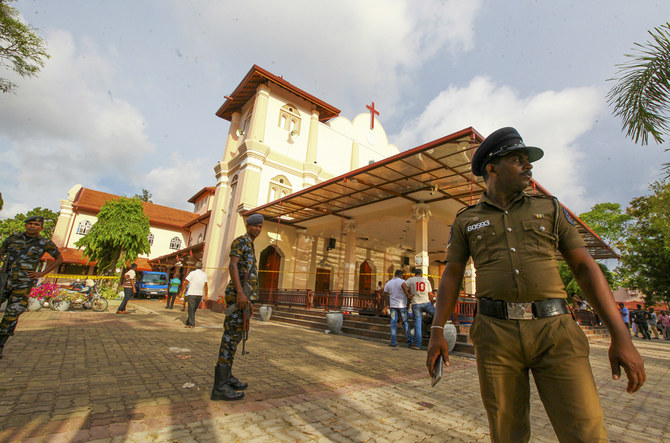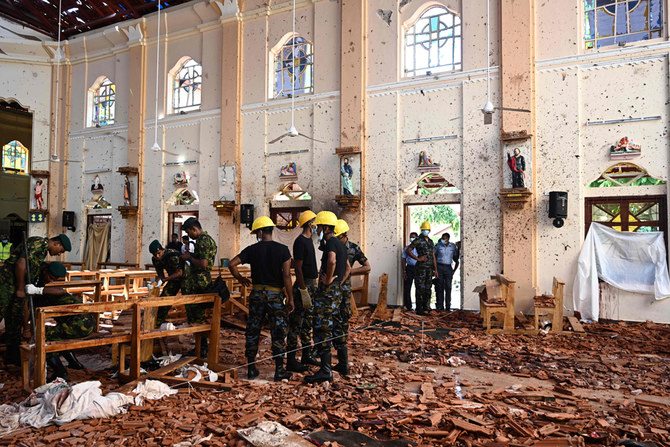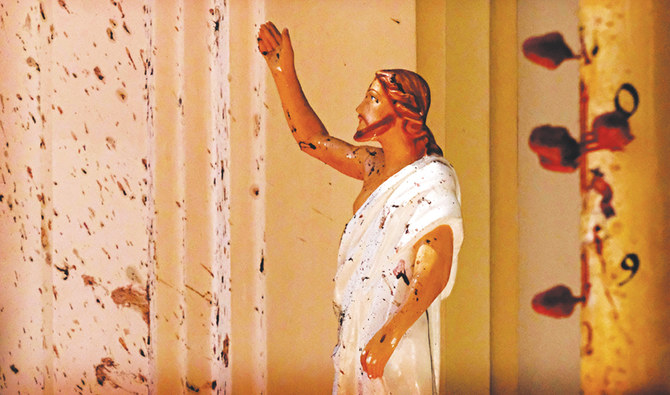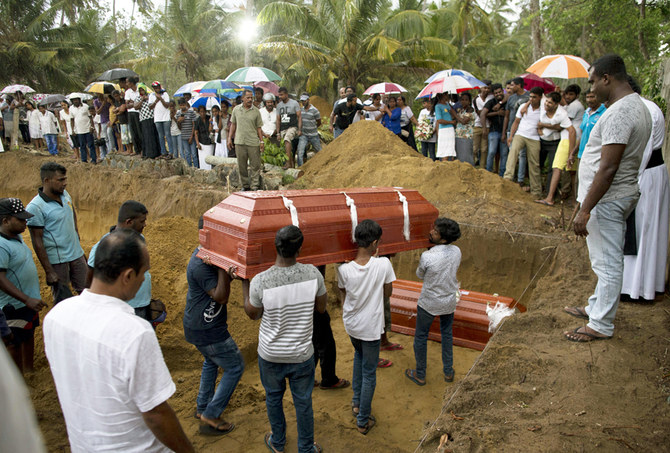DUBAI/COLOMBO: The children would have been gathered in the middle of St. Sebastian’s church with their families during the Easter Sunday morning mass when the bomber detonated his device, killing more than 100 people.
Just months before, on Jan. 20, the church congregation had celebrated its 150th anniversary, the building having recently undergone a major renovation.
But with the flick of a switch, its interior was reduced to rubble, mutilated bodies strewn across the pews and the floor where they had previously knelt to pray.
“It was supposed to be a day of celebration,” said Dubai-based priest Father Jude Angelo. “Instead, we’re mourning such a terrible loss.”
He is currently the assistant priest at Jebel Ali Church in Dubai, but his home is the Sri Lankan village of Katuwapitiya, where he was a member of St. Sebastian’s parish, the site of the deadliest of Sunday’s attacks, which killed at least 290 and injured more than 500 in churches and hotels across the country.
“I’ve been told that the bomber detonated his device while standing in the middle of the church,” he said.
“That’s where most of the children — some very young — and their families would’ve been congregated. I don’t understand the meaning of this attack … I just feel numb.”
Father Angelo found out about the blast via his mobile phone: People sent him images from inside the church.
“I have no words to express what I saw in those images. The church is broken. I saw images of dead bodies … parts of bodies … You couldn’t tell who these people were, their bodies were so badly mutilated,” he said.
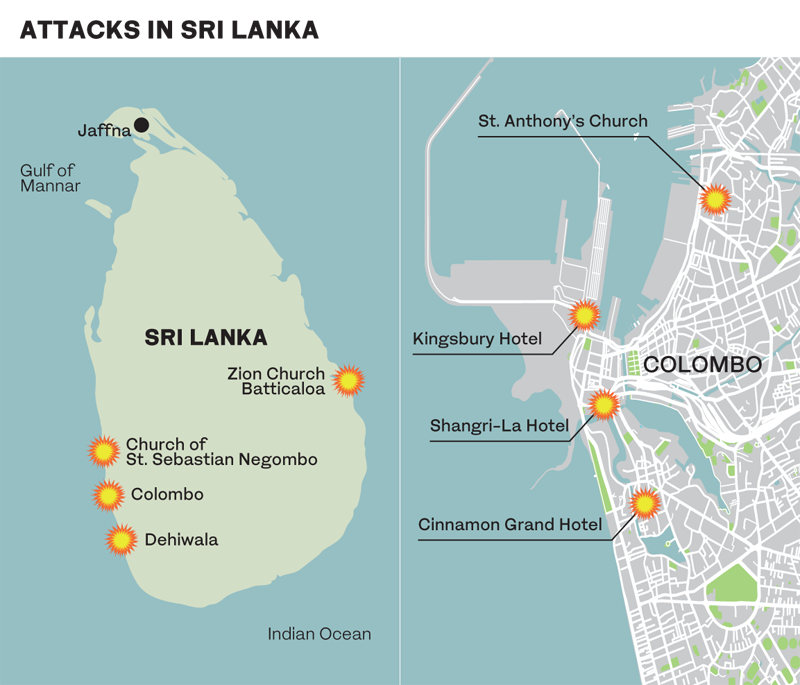
The congregation now has to plan for dozens of funerals. The roads leading to St. Sebastian’s are lined with white flags and throngs of crowds despite the heat.
Almost every other home along the lanes have banners hanging outside the walls, announcing deaths of family members. The whole neighborhood is in mourning.
Malith Wimanna was due to fly out for a conference in Malaysia on Monday, and went for mass on Saturday evening instead. His parents attended the Sunday mass, and both lost their lives in the attack.
“I ran to the church as soon as I heard about the attack,” he said. “It was hell. I couldn’t think of anything else. There was nothing to feel, nothing came to mind.”
Wimanna identified both his parents in the debris. He said both had possibly died instantly, and his father was almost unidentifiable.
The government announced on Monday that the attackers were members of the National Tawheed Jamaath (NTJ), an extremist Muslim group that appeared after the Sri Lankan civil war ended in 2009.
“The Catholics and Christians here are a very peaceful community,” said Father Anton Canisius, one of the many priests present at the funeral of Wimanna’s parents.
When asked about fears of the NTJ’s attacks propelling communal violence, the soft-spoken priest insisted that none of the Sri Lankan Catholic community would retaliate.
“There are people who’ll try to take advantage of these situations and try to make use of this. We’ve asked the government for security and for it to maintain peace,” he said.
Minister of Transport and Highways Kabeer Hashim on Monday announced compensation for those killed and injured in the blasts. He also said the damaged churches will be restored by the state to their original condition.
Easter is a popular time for holidaymakers to visit Sri Lanka from all over the world, and dozens of the victims of Sunday’s attacks were foreign tourists.
Among the foreigners killed were Mohamed Jafar and Hany Osman, cabin crew from Saudi Arabian Airlines, who were in transit at one of the three hotels hit. As of Monday evening their families, who had arrived in Colombo, had not yet finalized burial arrangements, though they were in consultation with the Saudi Embassy in Colombo, currently headed by Ambassador Abdulnasser Al-Harthi.
Tourism Minister John Amaratunga said in a statement that his ministry is working closely with the Foreign Ministry and local diplomatic missions to “ensure formalities with regard to the victims are sorted out as quickly as possible.”
He added: “The government has already offered assistance to all victims, the damaged places of worship as well as the hotels affected by Sunday’s attacks.”

Foreign victims were also from Japan, Australia, France, the US, India, Bangladesh, the UK, China, Turkey, Portugal, Spain, Belgium, the Netherlands and Denmark. They included three of the four children of Danish business tycoon Anders Holch Povlsen, who is the Nordic country’s richest man and a major private landowner in Britain.
Seventeen foreigners injured in the attacks are also being treated at the Colombo National Hospital as well as a private hospital in Colombo, while others have been treated and discharged.
Many of the tourists were killed in suicide attacks that targeted four hotels. At the Cinnamon Grand Hotel in Colombo, a suicide bomber waited in a queue for the Easter Sunday breakfast buffet before setting off explosives strapped to his back.
At the capital’s Shangri-La Hotel, Sri Lankan celebrity chef Shantha Mayadunne was enjoying breakfast with her family in the dining room. Her daughter Nisanga had posted a photo of the group on Facebook.
Minutes later, a massive explosion ripped through the hall, killing several, including the mother and daughter.
“It is with great sadness that we can confirm that we are aware of a number of casualties among our guests and colleagues. This includes three of our colleagues, who were fatally injured in the course of their duties,” a Shangri-La spokeswoman said in a statement.
“We will continue to work closely with local authorities and emergency services to provide our fullest assistance and support to all affected parties,” she added.
“Our hotel remains secured by the military and the police. We have also decided that the hotel will be closed until further notice.”
The spokeswoman said the hotel is providing alternative accommodation for affected guests, and has set up a dedicated helpline for guests and their loved ones to call: +603 2025 4619.


